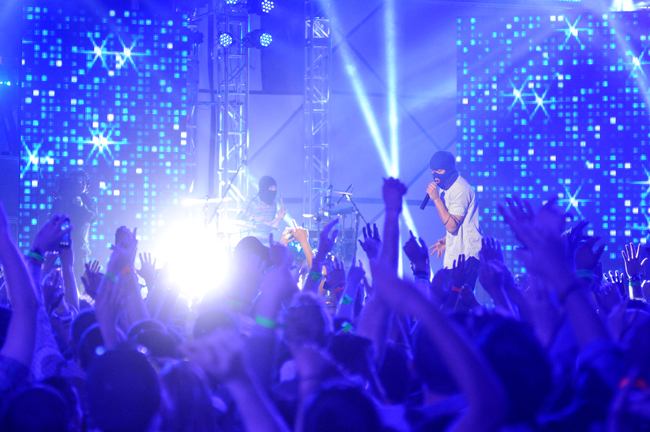SXSW Gets Bigger, Richer, Hipper and Ever More Pricey

Concert attendees cheer to Twenty One Pilots as they perform at the mtvU Woodies during last year’s South by Southwest. Attendance numbers and credential prices continue to rise, which may be turning the less affluent away. Photo by Pu Ying Huang.
By Ann Choi
For Reporting Texas
Complaints that South by Southwest is getting too big and rich for its britches have become as inevitable as bats under the Congress Avenue Bridge in recent years and are likely to escalate when Austin’s premier music, film and high-tech extravaganza opens for another probable record-breaking year on March 7.
Even the city’s digital cognoscenti grouse about crowded sidewalks, chockablock music clubs and film showings and the idea that the two-week festival’s ultra-hip Interactive conference has taken SXSW far from its intimate, fun-loving origins.
“The city’s infrastructure can’t support the growth,” said Omar L. Gallaga, technology culture reporter for Austin American-Statesman. “It also has gotten too expensive for an average person to attend.”
Not everyone agrees. “We’ve been corrupted … we are going to fail. We’ve been hearing that for the past 27 years,” said Louis Black, co-founder of SXSW. “We must be very good at fooling people for them to come back each year.”
One thing is certain—SXSW continues to boom. In 2013, the event registered 41,700 paying customers. That, along with a record total of 313,000 visitors during the festival period, generated an estimated $218.2 million in revenue citywide, nearly twice the figure for 2010, according to SXSW statistics.
Is it true that a bigger, wealthier SXSW is driving out the less affluent festival-goer?
The trend does seem to point in that direction. Last year, the share of individuals with household incomes over $150,000 grew to 35 percent compared with 2010, when the figure was 16 percent. (SXSW says 2010 is the earliest year for which it keeps those numbers.) Meanwhile, the share for individuals with incomes under $75,000 declined from 38 percent to 29 percent over the same period.
SXSW is also more expensive to attend now. In 1987, when SXSW started as a music-only conference, a wristband cost $10. This year, the walk-up rate for a platinum badge, which gives access to all three conferences, was $1,695. The average cost of a hotel room in 2013 was $225 a night, up 20 percent from the previous year, according to Greyhill Advisors, a consulting firm that has authored economic-impact studies commissioned by SXSW.
Ben Loftsgaarden, a consultant at Greyhill, thinks the increased cost to attend the conference reflects its growth and the rising spending SXSW organizers put into the conference.
What about the complaint that SXSW become more corporate under the influence of its thriving Interactive conference?
The numbers show that Interactive, added to SXSW in 1993, has grown explosively in the past five years, an uptick that, according to Interactive producer Shawn O’Keefe, “pretty much mirrors the rise of social media in general.”
Interactive drew national and corporate attention in 2007 and 2009, respectively, when SXSW showcased budding social media powerhouses Twitter and Foursquare. Last year Interactive claimed more than three-quarters of SXSW ticket-holders, and the numbers keep rising despite rising registration fees.
“It has really grown tremendously in size as well as the number of companies and sponsors,” Loftsgaarden said. Deloitte Consulting, American Express and Pennzoil are the main sponsors for Interactive this year.
In an earlier era, Interactive sessions drew mainly tech-inclined individuals — Web designers, programmers and digital artists, says Jon Lebowsky, a longtime SXSW attendee and technology consultant. Today the crowd inside the Interactive tent tends to be more business-oriented. “People who were small-scale entrepreneurs or geeks a decade or ago have money now, and they attract other people who are into making big money,” he said. “It has become a business conference.”
According to SXSW’s internal research, around 200 tech startups and existing companies received more than $587 million in investment funding over the past five years through Interactive’s SXSW Accelerator competition. It has spawned companies such as Siri that was, in turn, acquired by Apple, and WearDrobe and reMail that were acquired by Google.
SXSW officials and the city of Austin praise the growth of SXSW for the revenue it brings. “Despite the various challenges that a large-scale event provides, we see the size and scope as a positive,” O’Keefe said.
Others say SXSW has lost its charm because of the overwhelming growth. Michael Corcoran, a veteran music writer, says his colleagues don’t see the value in attending the conference as they did before.
Corcoran said overflow crowds and side activities such as unofficial concerts and marketing parties have become a distraction for some music industry professionals. While Interactive might be attracting SXSW-goers with more serious agendas, he says the opposite is taking place for the rest of the festival. Students or people without badges or wristbands have flooded into town for side activities that are often free of charge.
When big, publicity-hungry corporate sponsors put on events it means “free booze and free parties,” Corcoran said. “It’s a freeloader’s paradise.”
SXSW officials say they are aware of such complaints and have worked with the city to manage growth and address safety issues. This year, venues downtown have to go through the city of Austin to obtain event permits that would allow local businesses to turn their parking lots into concert and marketing venues. Last year, SXSW created a startup and entrepreneur conference in Las Vegas to siphon off crowds that would normally head for Austin.
The idea that SXSW might return to the smaller scale of yesteryear seems remote. More than 4,000 short films and 2,000 bands have applied to this year’s music and film conference. Speakers for Interactive include Chelsea Clinton among the hundreds of tech and media professionals. And Apple will host its first iTunes Festival in the U.S. featuring the band Coldplay.
Lebkowsky said he thinks “everybody should go to SXSW. And it looks like I’m getting my wish.”